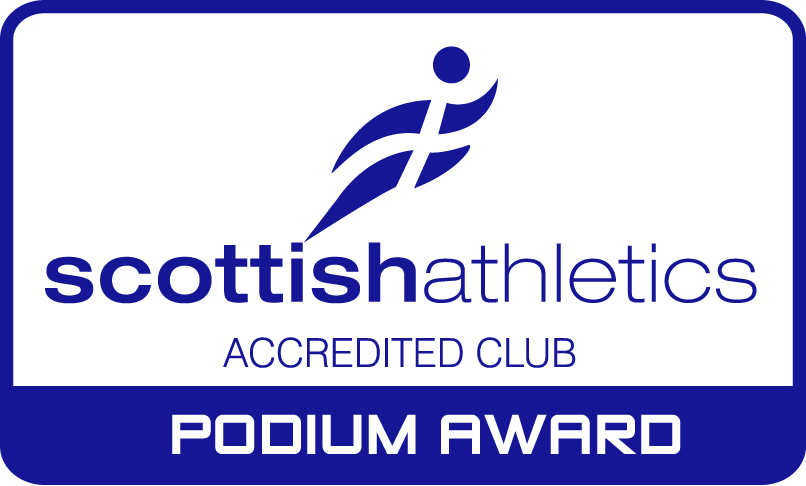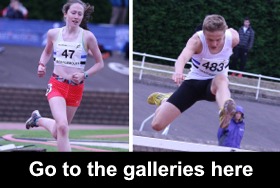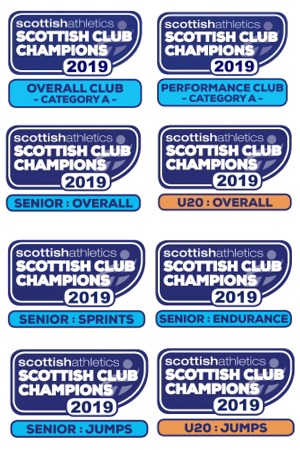It is with deep regret that we have to report the passing of George Sinclair, George was a top Coach and major driving force behind Edinburgh Southern Harriers.

George was one of the best – and at the same time one of the least known – coaches in the country, he had worked with several of the very best athletes the country has produced.
As an announcer, his voice has been heard and listened closely to by almost everyone in Scottish athletics: he was employed in that capacity at the Commonwealth Games.

A pupil at George Heriot’s School all the way up from primary to secondary level George competed for them as a sprinter and high jumper. In 1971, his enthusiasm for the sport, led to him being one of the founders of the very successful Octavians Athletic Club.

Octavians was formed in 1962 and was an amalgamation of eight of the Edinburgh fee paying’ schools, former pupils athletic clubs. Due to falling numbers and a consequent drop in standards, representatives of George Heriot’s School , Royal High School , Daniel Stewart’s College, Trinity Academy , George Watson’s College, Edinburgh Academy, Boroughmuir High School and Melville College met and the club was formed. George was the club president. Members were to include two Olympians (David Stevenson and David Jenkins), Commonwealth Games athletes (add John Jones and Ian Grant), GB internationalists (add Bob Hay, Adrian Weatherhead, Gordon Rule and Frank Dick) and many Scottish internationalists.
George ran the Post Office at Goldenacre and coached many internationalists from Edinburgh Southern Harriers club at Saughton and Fernieside as well as advising many young members.
The success of the club can be easily seen by checking out the ranking lists and international team personnel of the period. There was an emphasis on the explosive and technical events. George’s athletes contributed strongly to these performances
When the Octavians folded members of the club then went in the main to one or other of the two big clubs in the capital, with George joining up with Edinburgh Southern Harriers.
Edinburgh had many athletic clubs at this point but two big ones: the newer Edinburgh AC (established in 1962) challenging the dominant Edinburgh Southern Harriers which was one of the very best Scottish clubs. When Octavians went out of business their funds went to Edinburgh AC and their name was perpetuated in the very successful but now defunct Octavian Relays Meeting run by EAC.

George continued to coach athletes very successfully and one of the very best was Helen Golden, British and Scottish sprinter of very high quality indeed right from the very start as a girl running for ESH in 1965 until she retired from sprinting in 1980. The range of George’s coaching talents has already been indicated – sprints, hurdles, middle distance, long and triple jumps have all been mentioned already and another top class athlete who came under his influence was Anne Purvis

She says, “I started training with George when I was 14 in 1973. He was then Head Coach of Edinburgh Southern Harriers. He coached a number of athletes from sprints to Middle Distance. The athletes I trained with then were Helen Golden, Mary Munroe, Annie Littlejohn, Elaine Douglas and Fiona Macaulay.
George did not believe in over-training young athletes, so I only trained at a maximum of 3 times a week which gradually increased over the years eventually 6 days a week often twice a day. His training was always specifically targeted for competition either club, championships or international. George was always keen to learn as a coach and apply new ideas to your training. He always attended the Coaches Conventions organised by Frank Dick and would listen to other coaches.
He was also happy for you to train with other coaches as he arranged training sessions for me with Donny McLeod’s squad for elastic strength work in the winter and Bill Walker’s squad for quality sessions in the summer. Over the years a number of other athletes came to him for coaching including, Katherine Shepperd and Fiona Hargreaves. All the athletes I have mentioned became Scottish Internationalists, some also competing for Great Britain.
As a coach he was always very fair giving advice equally when he had two athletes in the same event. He always expected you to compete for the Club as it was extremely important to him. If things were not going well he looked for ways to encourage you and keep you interested in the sport. Finally I remember he always said that sport was only a part of your life and that first and foremost you should enjoy it.”
That contribution tells us a lot about George and what made him such a good coach:
How did that philosophy show up in practice? In athletics the yardstick must be quality of performance. Taking the 1975 athletics yearbook as an example we can look at the 1974 season. The women mentioned by Anne above all performed superbly well.
* Helen Golden had to be the stand out performer – the top 21 performances over 100m by a Scot, the top 21 performances by a Scot over 200m plus competition success for her club, for Scotland and for Britain winning races in all these colours. First year intermediate that season
* Elaine Douglas was third ranked in 100m and second in 200m.
* Anne Littlejohn had the top six 400m times and seven of the first eight.
* Anne Clarkson was also an Intermediate and had 5 of the top 20 400m performances, and was also ranked at 100m and 200m but made a major breakthrough at 800m when she ran 2:08.8 at the age of 15.
* Fiona McAulay was fourth fastest Scottish woman – and she was also an Intermediate that year.
* Fiona Hargreaves had pb’s of 23.8 for 200m, 53.34 for 400m, 2>11.1 for 800m. She ran in the ’86 Commonwealth Games in the 400m and 4 x 400m relay.
* Kathryn Shepherd was a top talent at events from 800m upwards and won the SWAAA 3000m in 1982 and was third in 1984.
The Inters all went on to excellent careers in the sport – Anne Clarkson’s was maybe particularly noteworthy. George was also known to be a top class coach for relay teams. His work with the sprinters and relays – the ESH time of 45.2 secs when they won the WAAA title at Crystal Palace in 1970 is the standout: it was faster than the Scottish team managed in the Commonwealth Games later that year (although the order was changed and one of them which wasn’t selected).
His credentials as a coach were well established but like all talented individuals he worked well on club committees and also represented the club on other bodies. Like most coaches and officials with an interest in the good of the sport, he was a man of strong opinions .
George was also a member of Edinburgh Sports Forum.2007, a body involved in athletics provision and government not only in Edinburgh but at a national level as well. After much re-organisation and various club combinations, there was at last a single club for Edinburgh which is currently Edinburgh AC and it encompasses both the former Edinburgh AC and Southern Harriers. In recognition of his contribution to the club George was made an honorary life member in 2002.
(from an article on Anent Scottish Running, with thanks to Brian McCauslan Author)
Our condolences to his wife Pat and all the family .
George’s funeral will take place at 1:00pm Monday 16th August at the Lorimer Chapel, Warriston crematorium in Edinburgh.









Leave a Reply